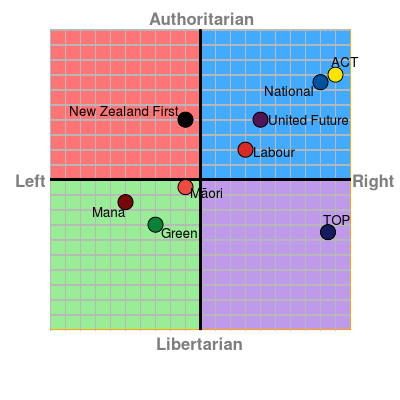New Zealand General Election 2017

The Green Party, in disarray after the resignation of its co-leader and two other prominent figures, has been electorally bruised. Conversely, the last-minute resignation of Labour’s decent but ineffectual leader, Andrew Little, following a dismal pre-election poll, has dramatically bolstered the party’s popularity. 37-year-old Jacinda Ardern has a good chance of achieving office, with the additional boost of frustrated Green voters returning home. These days NZ Labour seems to be one of the world’s most democratic parties. Everyone has a go at being leader.
While some Kiwi commentators talk excitedly of the ‘changing political landscape’, it’s essentially only the electoral landscape that’s changing. It’s less dull but no more diverse. Labour’s dedicated team of billboard volunteers have had to paste over the Little hoardings (‘Backing the Kiwi Dream’) with the more photogenic Ardern’s ‘A Fresh Approach’, now changed to the equally bloodless ‘Let’s Do This’. They’re all in stark contrast to their UK sister party’s recent electoral strapline: ‘For the Many, Not the Few’. Although UK Labour presently enjoys around 46 percent public support, most of the NZ parliamentary party would probably rather lose than potentially ignite the NZ public in a Corbynite manner. Ardern has been much more eager to tackle identity issues like gay rights than deeply ideological ones like globalisation and the consequential Transpacific Partnership Agreement. Unlike Corbyn and Sanders-style conviction politicians who attacked the fundamentals of the prevailing economic orthodoxy, Ardern is unthreatening to the status quo. She is a warm, smiling, fresh face with a socially liberal outlook. In that sense, she’s more in the mould of Blair, Trudeau, Macron and, yes, Key. The style publications are full of what they’re calling Jacindamania.
National Party Prime Minister Bill English presents himself as a safe pair of hands in the natural party of government. He’s considerably more socially conservative than his predecessor, which allows Ardern to create more clear blue water between National and Labour.
Labour’s radically moderate ‘debate’ with National (conservative) is not about the desirability of a neoliberal economy, but merely about which party can best manage it. Neoliberalism was, after all, introduced to New Zealand by the Labour Party. Today’s Labour Party remains economically to the right of the pre-1984 National Party. While the Greens show some signs of a conservative drift, their welfare policies are to the left of Labour’s.
New Zealand First may squeeze the Greens out of the number three position by once again highlighting the plight of the provinces.
Because of vagaries in economic areas, we’ve avoided placing The Opportunities Party until recently. It appears in the classic libertarian mould — right wing (ie neoliberal) economics coupled with libertarian social attitudes.
If Bill English is defeated in his first election as Prime Minister, he can put it down to the voters wanting a change after such a long period of National. If Jacinda Ardern is the loser, she can explain that it was because she didn’t have enough time to get established. If neither of them wins outright, New Zealand First may emerge as the kingmaker.
If significant policy shifts occur during the campaign, some chart positions, based on speeches, parliamentary voting records and manifestos, may alter accordingly.

